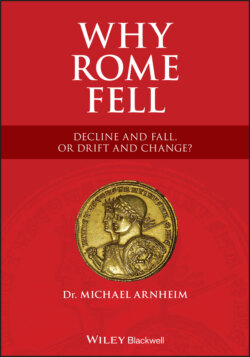Читать книгу Why Rome Fell - Michael Arnheim - Страница 25
“In the Consulship of Julius and Caesar”
ОглавлениеA visceral fear of one-man rule is characteristic of oligarchies and aristocracies, not least in the case of the Roman Republic, where, as mentioned above, this fear was stemmed by collegiality and rotation of office. However, a less than persuasive argument is put forward against this view by Lintott, who opines that, “We would be wrong…to see collegiality in principle as a form of constitutional check: the multiplicity of magistrates was perhaps in origin intended rather as cover for a multiplicity of functions and insurance against the sudden death or disability of a magistrate.” (Lintott, loc 1250.) The key word here is “perhaps.” The only evidence for this view is that “…we find the praetors and quaestors generally each having separate functions, although the treasury came to be entrusted to a pair of quaestors, and the aediles, curule and plebeian, worked in pairs in the administration of the games” (Ibid.). A key fact is that the consuls, who did not have “separate functions,” had a veto power over each other. And, besides the power of the holder of a higher magistracy to forbid a lower magistrate from acting in a certain way, a magistrate could use the power of intercessio, as it was called, to cancel a colleague’s action after it had occurred by acting in a contrary sense. But Lintott is anxious to wave this aside as well: “Where we find magistrates, other than tribunes, actually obstructing their colleagues in the late Republic, it is by exploiting their power of consulting the auspices in order to detect unfavourable religious omens” (Ibid.). This use of the auspices to block a colleague’s actions was a well-known political ploy which only confirms its function as an attempt to prevent an individual from becoming too powerful. An extreme example of this (not mentioned by Lintott) was the attempt in 59 BCE by Julius Caesar’s conservative co-consul, Marcus Calpurnius Bibulus, to block Caesar’s populist legislation by closeting himself at home and issuing proclamations announcing bad omens, of which no proof was required. (Suetonius, Julius, 20.1.) As a result, Bibulus was sidelined, and some jokers signed mock-formal documents dated “Done in the consulship of Julius and Caesar” instead of “Bibulus and Caesar.” (Ibid. 20.2.)
In sum, Bibulus’s religiosity, whether genuine or feigned, is just an extreme example of a magistrate’s armory to check and balance a colleague’s actions—quite in keeping with the republican ethos of elite group power designed to prevent any one individual from becoming too powerful. Because of Caesar’s popularity among the masses, Bibulus’s attempts to block him backfired. When he opposed Caesar’s land redistribution bill, he found himself attacked by an irate mob, which broke his fasces (the bundle of rods and an axe that symbolized his authority as a consul) and pelted him with feces. (Plutarch, Cato the Younger, 32.2.)
Violent conflicts like this foreshadowed the impending demise of the republic, with three civil wars in quick succession, first between Caesar and Pompey, then, after Caesar’s murder, between the Caesarians and Caesar’s assassins (the latter fighting for the continuance of the old oligarchical order), and, finally, between the two leading Ceasarians, Marcus Antonius and Caesar’s heir, the future Augustus, who emerged as sole ruler of the Roman world after his victory over Antony at Actium in 31 BCE. But, before discussing the repercussions of this momentous event, let us take a step backward.
